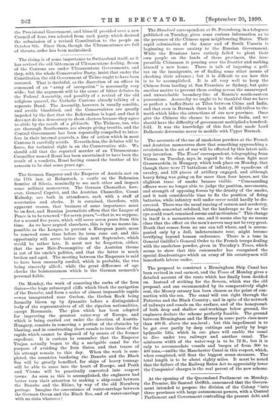The accounts of the use of smokeless powders at the
French and Austrian manceuvres show that something approaching a revolution in the art of war will be effected by this latest mili- tary invention. The Times' correspondent, telegraphing from Vienna on Tuesday, says, in regard to the sham fight near Grosswardein, in Hungary, which took place on Monday, that though there were 77 battalions of infantry, 36 squadrons of cavalry, and 128 pieces of artillery engaged, and although heavy firing was going on for more than four hours, not the slightest trace of smoke became visible. "Commanding officers were no longer able to judge the position, movements, and strength of opposing forces by the density of the smoke, and it took considerable time to fix the position of firing batteries, while infantry well under cover could hardly be dis- covered. There was the usual roaring of cannon and musketry, although somewhat subdued, but the landscape as far as the eye could reach remained serene and motionless." This change in itself is a momentous one, and it seems also by no means clear that the effect on the men's nerves may not be very great. Death that comes from no one can tell where, and is accom- panied only by a dull, indeterminate roar, might become terrifying beyond human endurance. There is a tone -in General Gallifet's General Order to the French troops dealing with the smokeless powder, given in Tuesday's Times, which seems to show that this commander has recognised the special disadvantages which an army of his countrymen will henceforth labour under.


































 Previous page
Previous page